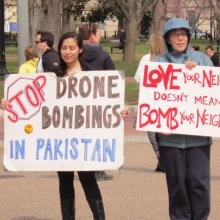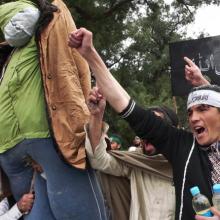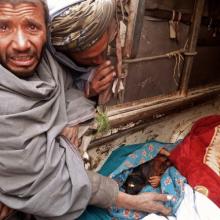Peace
 Earlier this month, I boarded a train with my brother-in-law and headed to Chicago to protest the 2012 NATO Summit. If you are asking "why protest?" you can find a substantial list here.
Earlier this month, I boarded a train with my brother-in-law and headed to Chicago to protest the 2012 NATO Summit. If you are asking "why protest?" you can find a substantial list here.
Security had been ramped up and no food or liquids were allowed on the train. We met some fellow protesters during the trip and when we arrived at Union Station we hustled to make it to Grant Park on time. In transit to the park the sun was already warming our necks and I found myself reaching for the small tube of sunblock that I had stashed in my pocket.
We arrived in plenty of time to catch the pre-march rally at Petrillo Bandshell. Many stories were shared by fellow activists from around the world. The air was humid, yet vibrating with the passion of thousands as we prepared to march together for peace.
Amidst a swirl of percussion the crowd was chanting: "We are unstoppable! Another world is possible!"
This coming fiscal year, the United States is set to spend more than $640 billion dollars on the Pentagon and war, accounting for more than 60 percent of federal domestic spending. In excess of $85 billion of that will be spent on the war in Afghanistan alone.
This unfathomable amount of money was approved by the House of Representatives in the National Defense Authorization Act. These funds will serve to bring suffering and pain to innocent people, further militarize the world and undermine peace and stability for generations to come—all on the backs of those who struggle at home.
In the backdrop of such spending, we’re told that we’re in a financial crisis. Elected officials tell us it is time to make tough choices. There isn’t enough money for programs like “Meals on Wheels” and for ensuring everyone has access to adequate healthcare. Our schools and bridges must wait to be repaired. New roads and schools must remain unconstructed.
Yet some of us know better.
 CLICK HERE TO HELP PROTECT POVERTY PROGRAMS FROM FEDERAL BUDGET CUTS (and get an "End Poverty" or "Wage Peace" bumper sticker.)
CLICK HERE TO HELP PROTECT POVERTY PROGRAMS FROM FEDERAL BUDGET CUTS (and get an "End Poverty" or "Wage Peace" bumper sticker.)
Gen. John Allen, the U.S./NATO commander in Afghanistan, is reorienting the military mission in Afghanistan. As U.S. troops leave, Afghan troops must take the lead.
Faced with an order from President Obama to withdraw 23,000 troops by the end of the summer, and the prospect of further reductions next year, Allen is hastily transforming the U.S. military mission in Afghanistan. Instead of trying to continue large U.S. counterinsurgency operations for as long as he can, he is accelerating a handover of responsibility to Afghan security forces. He plans to order American and NATO troops to push Afghans into the lead across much of the country this summer, even in insurgent-ridden places that had not been candidates for an early transfer.
For Reuters, Sebastian Moffett reports on a new Human Rights Watch report:
From The Associated Press' Anne Gearan:
"Support for the war in Afghanistan has reached a new low, with only 27 percent of Americans saying they back the effort and about half of those who oppose the war saying the continued presence of American troops in Afghanistan is doing more harm than good, according to an AP-GfK poll.
In results released Wednesday, 66 percent opposed the war, with 40 percent saying they were "strongly" opposed. A year ago, 37 percent favored the war, and in the spring of 2010, support was at 46 percent. Eight percent strongly supported the war in the new poll."
I was asked recently, is there really any hope for Israel? The answer is yes, there is.
First, the state of Israel has lived its entire existence in the foxhole of the war paradigm. It is time to come out of the foxhole. It is time for Israel to exercise profound concern, not only for its own security and its own peace, but also for the security and peace of its neighbors—the Palestinians.
Second, It is time for Palestinians to recognize Israel’s right to be secure. Israeli mothers should never have to worry if their daughters and sons will return from a walk to the market. Every Israeli should not have to live in extreme fear and the ever present threat of war.
A provocative piece this morning from Akiva Eldar, chief political columnist and an editorial writer for Haaretz. He describes the weakness of the Israeli government when faced with non-violent protest:
“They say the Israel Air Force can carry out a pinpoint strike against Iran's nuclear facilities, yet the Israel Defense Forces loses its cool when confronted by a small group of bicyclists armed solely with cameras. The Shin Bet security service knows how to locate terrorists and assassinate them, but has no clue how to cope with nonviolent civil disobedience.”
After recounting all of the futile efforts at diplomacy and negotiations by the Palestinians in their suits and ties, Eldar advises:
“If Abbas was really so fed up he would replace his tie with a kaffiyeh and lead the masses in a protest march. The Oslo Accords have turned the Palestine Liberation Organization into the mechanism for maintaining the Israeli occupation. It's about time the Oslo generation of Palestinians admits the failure of the diplomatic option, hangs up its suits, weans itself from the pathetic honor it has accorded itself, and takes to the streets.”
I can hear Gandhi and Dr. King cheering.
Each year, the Stockholm International Peace Research Institute (SIPRI) publishes a study on the amount world governments spend on their militaries. The 2011 report was released this week, showing that all countries together spent $1.7 trillion. The Guardian has a helpful country-by-country data page and interactive map. The top 5 in the world last year, totaling $1.05 trillion, were:
U. S. - $711 billion
China - $143 billion
Russia - $72 billion
Britain - $63 billion
France - $62 billion
In contrast, the budget for UN Peacekeeping operations for fiscal year July 2011-30 June 2012 is about $7.84 billion. That’s 0.5 percent of what the world spends on its militaries.
It’s a stark example of the world’s misguided priorities.
On November 21, 1967, General William Westmoreland, U.S. commander in Vietnam, delivered a speech at the National Press Club on war strategy. “We have reached an important point when the end begins to come into view,” he said, and outlined a “new phase” in the war where the U.S. would:
- Help the Vietnamese Armed Forces to continue improving their effectiveness.
- Help the new Vietnamese government to respond to popular aspirations and to reduce and eliminate corruption.
- Help the Vietnamese strengthen their policy forces to enhance law and order.
Then came what is now known as the Tet Offensive. On January 30, 1968, the National Liberation Front launched attacks against cities and towns throughout South Vietnam. It was the beginning of the end, the evidence that U.S. strategy had failed.
Fast forward 45 years. U.S. strategy in Afghanistan emphasizes assisting the Afghan army and police forces to improve their effectiveness along with working to reduce corruption in the government. We hear encouraging speeches from politicians and generals. We’re told the end is in sight.
When I was in my early 20’s, a Bible teacher by the name of Dianne Kannady posed a rhetorical question that continues to haunt me to this day: “If Jesus was your only source of information about what Christianity should look like, how would you live your life?”
That question has gotten me into a lot of trouble over the years.
Consider the three things that instantly come to mind.
1. Jesus preached nonviolence.
2. Jesus was a faith healer.
3. Jesus challenged the religious fundamentalists of his day.
Last week, anonymous U.S. officials told the media that the U.S. military wouldn't stop the drone-launched missile attacks, which they have been carrying out for years within Pakistan.
Discouraging news, indeed. But we all need encouragement, so here's a little good news—images of a chance encounter of a peace-building kind.
George Masters, combat veteran and freelance writer, writes of driving behind a car with two 'Support Our Troops' ribbons. In his head, he responds:
I’m driving angry. I want to tell the guy in front of me: You want to support the troops? Get them the hell out of the line of fire. Or, if you think this war is so necessary, get over there yourself. If you’re too old, pull your kids or grandkids out of college and send them.
I’m driving sad. You want to support our troops? Give the man some space when he gets home. Give the woman a jo
After a vivid and harrowing description of his 1968 combat tour in Vietnam, he ends:
You want to do something for our troops? Bring them home.
As is increasingly evidenced by developments in Afghanistan from gloomy intelligence reports to the Quran burning to the recent massacre of 16 Afghan civilians, including nine children, it is long past time for the U.S. military to leave that country.
After weeks of tumultuous upheaval, the slaying allegedly by a U.S. Army Staff Sergeant is just the most recent incident undermining U.S. objectives to win hearts and minds. Frankly, that mission has long been lost.
We are still learning about the Staff Sergeant, a married father of two. It appears he was deployed to both Iraq and Afghanistan a total of four times. On one of those tours, he suffered a traumatic brain injury (TBI), but was declared “fit for duty” by the U.S. Army. Afghans would certainly beg to differ. This is also more evidence that the U.S. military cannot be allowed to deploy troops with diagnosed psychological issues—such as Post Traumatic Stress or TBIs, a messaged pushed by a project called Operation Recovery.
If you were walking down the street and a stranger approached you and punched you in the face what would you want to do in that moment? Sure, this is an odd hypothetical situation, but really, answer the question.
Few would say, “I would want to give that person a hug.” Depending on the size of the attacker most would either fight back or run away. But let’s suppose you fought back, and even vanquished your assailant, pummeling him repeatedly for his dastardly deeds. What then?
Would he, through being beaten, come to understand his wrong in hitting you? No, he might start plotting his revenge, or his friends would think about getting you back for what you did. If they did, then you would have friends that would want to get them back. So it goes with the endless spiral of violence.
We have been fooled into believing that violence is a respectable solution for problems in our world. What we fail to see is the many problems that violence brings with it, beginning with more violence. Violence also brings hurt, fear, anger, a desire for revenge, death and enmity.
The news spread through the city of Suleimaniya so quickly. Within an hour, Kurdish news outlets let the locals know that something bad had happened. From there, it moved even more quickly across the ocean.
By the evening of March 1, I was shocked to read it in my Manitoba prairie city’s newspaper: “Iraqi student kills American teacher in Christian school murder-suicide.“
Along with the bare facts, the questions and rumours arose. Why had the 18-year-old Kurdish boy carried a handgun to class in a Christian school in Suleimaniya and shot his teacher to death?
Was it the result of religious disagreement?
Was there some other kind of conflict between the two of them?
How could a handgun have entered the classroom?
Some our Kurdish partners called a meeting to see if some sort of action should take place. None of us had known either the teacher or the boy. Reports said that this type of shooting was not so unusual, that it happens in the United States all the time. But violence like this had never happened in a school in Kurdish Northern Iraq. Kurds were reeling and asking themselves what is it about their country that allows people to settle differences with a gun in a classroom?
Another 16 lives were added to the body count of the war in Afghanistan over the weekend.
All of them civilians, nine were children, including one three year old girl.
The alleged perpetrator, a U.S. Sergeant, killed many of the victims with a single shot to the head before he piled together eleven of the bodies and set them on fire.
There is no way to measure the loss for the families of the victims, no way to understand the harm done to peace process in the country and no way to calculate the additional deaths of Americans, Afghans and others from across the world this will likely cause.
There is no way to know the full cost of war.
In a speech to the American Israeli Public Affairs Committee’s annual policy conference in Washington, D.C. on Sunday, President Obama urged Israeli leaders to refrain from "loose talk of war" related to escalating tensions with Iran. Quoting his predecessor President Theodore Roosevelt, Obama said when it comes to the Iran situation, both the United States and Israel would do well to, "Speak softly... and carry a big stick."
Obama meets with Israeli Prime Minister Binyamin Netanyahu today at the White House. Netanyahu, who is scheduled to speak to the AIPAC conference this evening, issued a short statement repsonding to Obama's speech Sunday, saying in part, "I appreciated the fact that he said that Israel must be able to defend itself, by itself, against any threat."

Prince of Peace Abbey, Oceanside, Calif. Photo by Randy OHC/Wylio http://bit.ly/wFY3hy
As a person who (loosely) identifies with the evangelical tradition, allow me to make a clear, unambiguous, declaration: GOD IS PRO-PEACE!
You may be thinking, “Just how exactly does a guy who claims to believe in the inspiration of Scripture arrive at the conclusion that God is pro-peace? Has this guy even read the Bible? Maybe he’s one of those amnesia-type Christians, the ones who read through the Bible every year as part of their daily devotions, and every time they get to the slavery and genocide passages, their mind goes ______________.
Maybe it wasn't those exact words, but whatever you were thinking, believe me, I get it!

The Rev. John Helmiere, who was beaten by police during a nonviolent protest in December. Via http://bit.ly/vP6XVT.
Amidst the recent police violence in Oakland and the sure temptation of some protestors to resort to violence, I wrote this little reflection inviting all Occupiers to a renewed commitment to nonviolence.
There is a verse in the Bible that says, “Our battle is not against flesh and blood but against the principalities and powers of this dark world.” It is a reminder that there are people behind oppressive structures — people who laugh and cry and bleed just like everyone else — and those people are not the enemies, but the systems are.
I was reminded of this when I went into Bank of America on Move Your Money Day, and transferred my money to the non-profit credit union here in Philadelphia. As I went into the bank, I saw the smiling faces of Bank of America tellers who have become friends over the past decade. When I told them I was closing my account, one of the women asked jokingly, “You don’t like us anymore?” At first my heart sunk, but then I said, “No way, I love the heck out of all of you. I just don’t like the values of the bank you work for.” To my surprise, they all smiled. In fact they may not like the values of the bank they work for either. Even though I’ll be leaving Bank of America, I’m hoping to stay in touch with my friends there. I may even take them some coffees next week, which I’ll charge on my new credit union debit card.
It is always tempting to demonize people and humanize corporations. It’s easy to forget that we are up against something bigger than flesh and blood people. And it’s particularly easy to forget that people are not the enemy when people are shooting pepper spray in your face.





